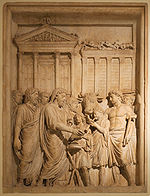- Numen
-
For the academic journal, see Numen (journal)."Numina" redirects here. For the musician, see Jesse Sola.Not to be confused with Noumena.
 Marcus Aurelius (head covered)
Marcus Aurelius (head covered)
sacrificing at the Temple of JupiterPractices and beliefsImperial cult · festivals · ludi
mystery religions · funerals
temples · auspice · sacrifice
votum · libation · lectisterniumPriesthoodsCollege of Pontiffs · Augur
Vestal Virgins · Flamen · Fetial
Epulones · Arval Brethren
Quindecimviri sacris faciundisJupiter · Juno · Neptune · Minerva
Mars · Venus · Apollo · Diana
Vulcan · Vesta · Mercury · CeresOther deitiesJanus · Quirinus · Saturn ·
Hercules · Faunus · Priapus
Liber · Bona Dea · Ops
Chthonic deities: Proserpina ·
Dis Pater · Orcus · Di Manes
Domestic and local deities:
Lares · Di Penates · Genius
Hellenistic deities: Sol Invictus · Magna Mater · Isis · Mithras
Deified emperors:
Divus Julius · Divus Augustus
See also List of Roman deitiesRelated topicsRoman mythology
Glossary of ancient Roman religion
Religion in ancient Greece
Etruscan religion
Gallo-Roman religion
Decline of Hellenistic polytheism
Numen ("an influence perceptible by mind but not by senses", pl. numina) is a Latin term for a potential, guiding the course of events in a particular place or in the whole world, used in Roman philosophical and religious thought. The many names for Italic gods may obscure this sense of a numinous presence in all the seemingly mundane actions of the natural world.[1]
The word was also used in the imperial cult of ancient Rome, to refer to the guardian-spirit,[citation needed] 'godhead' or divine power of a living emperor—in other words, a means of worshiping a living emperor without literally calling him a god.
The word numen is also used by sociologists to refer to the idea of magical power residing in an object, particularly when writing about ideas in the western tradition. When used in this sense, numen is nearly synonymous with mana. However, some authors reserve use of mana for ideas about magic from Polynesia and southeast Asia.
Due to its use as a central term in Roman religion, Numen is the name of an academic journal on history of religions.
Contents
Similar cultural concepts
The concept of a life-energy inherent in all living beings seems to be a fairly universal archetype, and appears in numerous ancient religions and systems of metaphysics.
Analogies to numina in other societies:
- ashe in Yoruba mythology
- Kami in Japanese Shinto
- mana in Polynesian mythology
- maban in Australian Aboriginal mythology
- manetuwak in Lenape mythology
- shekhinah in Semitic mythology
- sila, inua in Inuit mythology
- teotl in Aztec mythology
- wod in Anglo-Saxon mythology
See also
References
- ^ The animistic aspect of Roman religion is generally noted in all surveys, though as a phase characterising the earliest, most fundamental layers in a pseudo-evolutionary model of Italic religion it is criticised as "mostly a scholarly fiction" by Kevin McGeough, The Romans: new perspectives 2004:179 "Numinous Forces and Other scholarly Inventions"; "Scholars may have to content themselves with nodes of meanings for the Italic gods rather than hard-and-fast definitions", observes Charles Robert Phillips III, in "A Note on Vergil's Aeneid 5, 744", Hermes 104.2 (1976:247-249) p. 248, with recent bibliography; Gerhard Radke's classification of the forms and significances of these multifarious names in Die Götter Altitaliens (Münster, 1965) was criticized as "unwarranted precision" in the review by A. Drummond in The Classical Review, New Series, 21.2 (June 1971:239-241); the coupling and uncoupling of Latin and Italic cognomina of the gods, creating the appearance of a multitude of deities, were classically dissected in Jesse Benedictus Carter, De Deorum Romanorum Cognominibus: Quaestiones Selectae (Leipzig, 1898).
- Rudolf Otto, The Idea of the Holy.
External links
Categories:- Ancient Roman religion
- Religion
- Sociology of religion
- Vitalism
Wikimedia Foundation. 2010.
